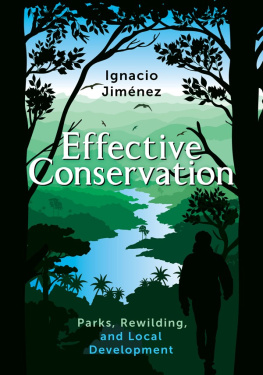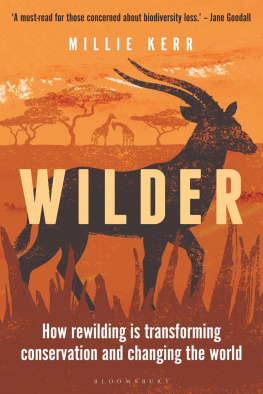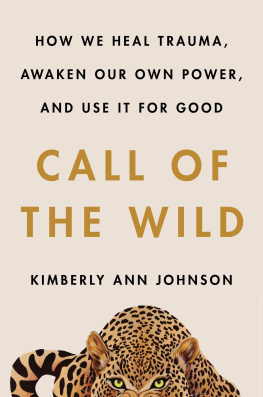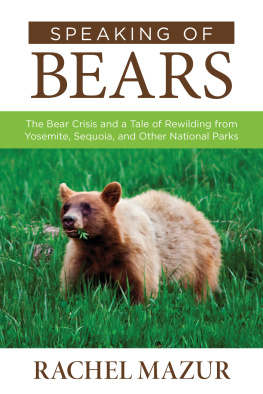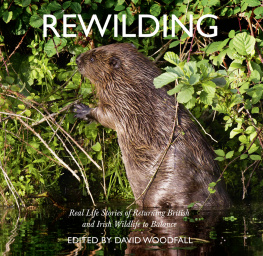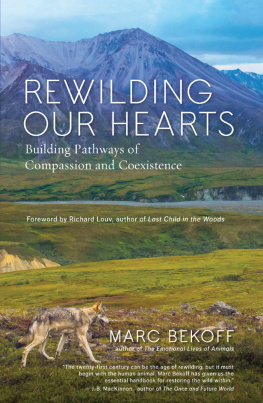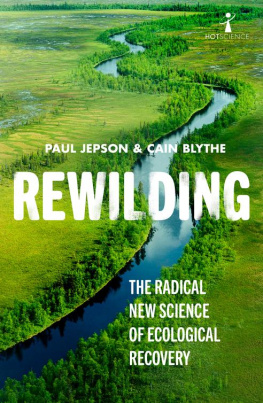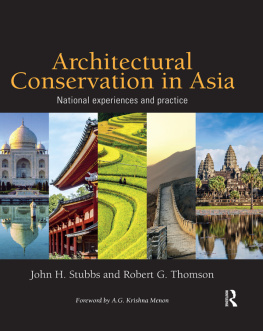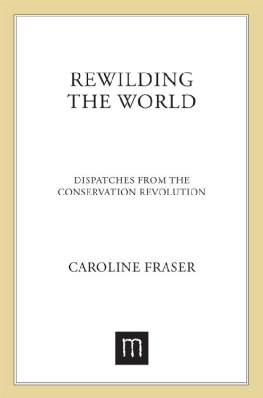Ignacio Jiménez - Effective Conservation: Parks, Rewilding, and Local Development
Here you can read online Ignacio Jiménez - Effective Conservation: Parks, Rewilding, and Local Development full text of the book (entire story) in english for free. Download pdf and epub, get meaning, cover and reviews about this ebook. year: 2022, publisher: Island Press, genre: Politics. Description of the work, (preface) as well as reviews are available. Best literature library LitArk.com created for fans of good reading and offers a wide selection of genres:
Romance novel
Science fiction
Adventure
Detective
Science
History
Home and family
Prose
Art
Politics
Computer
Non-fiction
Religion
Business
Children
Humor
Choose a favorite category and find really read worthwhile books. Enjoy immersion in the world of imagination, feel the emotions of the characters or learn something new for yourself, make an fascinating discovery.
- Book:Effective Conservation: Parks, Rewilding, and Local Development
- Author:
- Publisher:Island Press
- Genre:
- Year:2022
- Rating:4 / 5
- Favourites:Add to favourites
- Your mark:
- 80
- 1
- 2
- 3
- 4
- 5
Effective Conservation: Parks, Rewilding, and Local Development: summary, description and annotation
We offer to read an annotation, description, summary or preface (depends on what the author of the book "Effective Conservation: Parks, Rewilding, and Local Development" wrote himself). If you haven't found the necessary information about the book — write in the comments, we will try to find it.
Effective Conservation: Parks, Rewilding, and Local Development — read online for free the complete book (whole text) full work
Below is the text of the book, divided by pages. System saving the place of the last page read, allows you to conveniently read the book "Effective Conservation: Parks, Rewilding, and Local Development" online for free, without having to search again every time where you left off. Put a bookmark, and you can go to the page where you finished reading at any time.
Font size:
Interval:
Bookmark:

Since 1984, the nonprofit organization Island Press has been stimulating, shaping, and communicating ideas that are essential for solving environmental problems worldwide. With more than 1,000 titles in print and some 30 new releases each year, we are the nations leading publisher on environmental issues. We identify innovative thinkers and emerging trends in the environmental field. We work with world-renowned experts and authors to develop cross-disciplinary solutions to environmental challenges.
Island Press designs and executes educational campaigns, in conjunction with our authors, to communicate their critical messages in print, in person, and online using the latest technologies, innovative programs, and the media. Our goal is to reach targeted audiencesscientists, policy makers, environmental advocates, urban planners, the media, and concerned citizenswith information that can be used to create the framework for long-term ecological health and human well-being.
Island Press gratefully acknowledges major support from The Bobolink Foundation, Caldera Foundation, The Curtis and Edith Munson Foundation, The Forrest C. and Frances H. Lattner Foundation, The JPB Foundation, The Kresge Foundation, The Summit Charitable Foundation, Inc., and many other generous organizations and individuals.
The opinions expressed in this book are those of the author(s) and do not necessarily reflect the views of our supporters.
2022 Ignacio Jimnez
All rights reserved under International and Pan-American Copyright Conventions. No part of this book may be reproduced in any form or by any means without permission in writing from the publisher: Island Press, 2000 M Street, NW, Suite 480-B, Washington, DC 20036-3319.
Book design by Andrs Stubelt
Translation by Michael Loockwood & Ignacio Jimnez
Illustrations by Lalo Kubala
Library of Congress Control Number: 2021945118
All Island Press books are printed on environmentally responsible materials.
Manufactured in the United States of America
10 9 8 7 6 5 4 3 2 1
Keywords: Island Press, biodiversity, conservation, rewilding, nature reserves, parks, local development, policy, environmental conflict, communication, conservation biology, Africa, Latin America, Europe, Australia, United States, India, planning, evaluation, organizations, leadership, Tompkins, wildlife management, activism
ISBN-13: 978-1-64283-246-4 (electronic)
The book you have in your hands was first published in Spanish in 2018. It describes a practical and cohesive method for managing effective conservation programs, backed up and enriched by real-life examples taken from relevant conservation programs that I myself and other conservation practitioners have experienced on five continents.
Since its initial publication, the approach described in this book has guided and strengthened conservation programs in several countries. In December 2018, approval was granted for the 138,140-ha Iber National Park and in the following years my friends and former colleagues from Conservation Land Trust Argentina (renamed as Rewilding Argentina) witnessed the birth of the first green-winged macaws in Argentina originating from reintroduced individuals after over a century of absence. In 2021 they celebrated the release of the first jaguars into the park, a vital step in their pioneering reintroduction project. Overall, the story of Iber (which makes up large sections of this book) is one of the best examples worldwide of a virtuous circle whose constituent parts include the creation of a large park, its rewilding, and the establishment of a new cultural and economic regional identity based on a reevaluation of a previously unappreciated wilderness. This self-sustaining circle is termed Full Nature or Produccin de Naturaleza in its original Spanish. Since the book was first published, Rewilding Argentina/Tompkins Conservation has applied this approach in regions as diverse as the Dry Chaco, coastal and continental Patagonia, and Tierra del Fuego. In 2019 Tompkins Conservation Chile handed control of the Pumalin and Patagonia national parks over to the Chilean government, thereby concluding the largest private land donation ever made anywhere in the world. In doing so, they established five new national parks and expanded three others, covering in total more than 4 million ha of new national parklands.
In 2017 the vision behind this book traveled from Argentina to Brazil to help the Brazilian organization SPVS design and apply an ambitious program aimed at presenting the largest remnant of Atlantic Forest (one of the worlds top biodiversity hotspots) in a new and more positive light. As a result of this program, the introductory story presented in of this book is now somewhat outdated as the situation in the Atlantic Forest has been changed by the very ideas included in these pages. Two years later the Produao de Natureza approach (as it is known in Portuguese) started to be used by Instituto Home Pantaneiro to promote the largest conservation landscape to have ever been set up in the Brazilian Pantanal.
In the second half of 2018 I moved to Spain to apply this method in my home country. The plan was to establish a conservation landscape that could promote another virtuous circle between larger protected areas, rewilding, and local development. After talking with conservation experts we chose the Three Kingdoms region in eastern Spain. This region is home to vast mountain landscapes, recovering wildlife populations, and beautiful historic towns and villages that lost much of their original population during the last century. After getting support from international donors and building an alliance with environmental officials, we started a communication campaign similar to those successfully carried out in Argentina and Brazil, using the tools and concepts described in this book. Things were going better than expected until the COVID pandemic forced a lockdown on us. This halted all face-to-face meetings and presentations with local authorities and interest groups. Conspiracy theories developed; a well-orchestrated hate campaign, started in the social networks, was picked up by the conventional media. To cut a long story short, in the end we had to cancel the whole program as we were unable to counteract the animosity and rejection that had built up in the region. Albeit at a high price, the Three Kingdoms experience underlined one of the main ideas behind this book: the context defines the application of any general conservation method or approach. Lessons were learned and, with organizational support from Fundacin Global Nature, we are applying theideas of this book in other regions of Spain. All these examples show how this book has had a life of its own and has been able to guide conservation programs in at least three countries in the years leading up to the publication of Effective Conservation in English.
Effective Conservation is a streamlined version of the original Spanish edition. We wanted to create an accessible text while maintaining the essence of the original. To achieve this we have created a parallel website that hosts all the original content not included in this version (www.islandpress.org/effective-conservation). These bonus tracks include the complete versions of most of the boxes written by conservation practitioners, plus many sections included in the original book but excluded from the English version. We believe that this dual presentation will make this book accessible to a wider public and will also provide more curious readers with access to a great range of information available on the web.
Font size:
Interval:
Bookmark:
Similar books «Effective Conservation: Parks, Rewilding, and Local Development»
Look at similar books to Effective Conservation: Parks, Rewilding, and Local Development. We have selected literature similar in name and meaning in the hope of providing readers with more options to find new, interesting, not yet read works.
Discussion, reviews of the book Effective Conservation: Parks, Rewilding, and Local Development and just readers' own opinions. Leave your comments, write what you think about the work, its meaning or the main characters. Specify what exactly you liked and what you didn't like, and why you think so.

